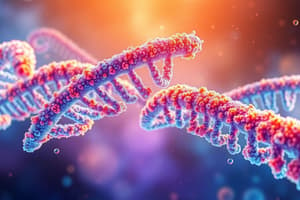Podcast
Questions and Answers
What are the two main processes involved in protein synthesis?
What are the two main processes involved in protein synthesis?
- Translation and transcription
- Replication and condensation
- Transcription and translation (correct)
- Synthesis and degradation
Which of the following molecules is primarily involved in the transcription process?
Which of the following molecules is primarily involved in the transcription process?
- DNA (correct)
- Lipids
- RNA
- Protein
What is produced during the translation process?
What is produced during the translation process?
- RNA
- Nucleotides
- DNA
- Amino acids (correct)
Which term describes the process of converting genetic information into protein?
Which term describes the process of converting genetic information into protein?
What is the first step in DNA replication?
What is the first step in DNA replication?
Which enzyme is primarily responsible for synthesizing new DNA strands during replication?
Which enzyme is primarily responsible for synthesizing new DNA strands during replication?
What is the purpose of the RNA primer in DNA replication?
What is the purpose of the RNA primer in DNA replication?
How are Okazaki fragments formed during DNA replication?
How are Okazaki fragments formed during DNA replication?
What occurs after the DNA strands have been synthesized in replication?
What occurs after the DNA strands have been synthesized in replication?
What is the end product of DNA replication?
What is the end product of DNA replication?
Why does DNA replication occur before cell division?
Why does DNA replication occur before cell division?
Which statement accurately describes the role of DNA replication?
Which statement accurately describes the role of DNA replication?
What type of strands compose the two DNA molecules formed after replication?
What type of strands compose the two DNA molecules formed after replication?
What happens to genetic information during DNA replication?
What happens to genetic information during DNA replication?
What is the role of mRNA in the ribosome during protein synthesis?
What is the role of mRNA in the ribosome during protein synthesis?
Which component of the ribosome does mRNA initially attach to?
Which component of the ribosome does mRNA initially attach to?
What is the function of tRNA during the translation process?
What is the function of tRNA during the translation process?
How does the tRNA know which amino acid to bring to the ribosome?
How does the tRNA know which amino acid to bring to the ribosome?
What process follows mRNA attaching to the small ribosomal subunit?
What process follows mRNA attaching to the small ribosomal subunit?
What role do daughter DNA molecules play in cellular processes?
What role do daughter DNA molecules play in cellular processes?
Which of the following statements about DNA replication is true?
Which of the following statements about DNA replication is true?
What is the primary significance of daughter DNA in biology?
What is the primary significance of daughter DNA in biology?
In what context is the term 'daughter DNA' used?
In what context is the term 'daughter DNA' used?
Which of the following best describes the relationship between parent and daughter DNA molecules?
Which of the following best describes the relationship between parent and daughter DNA molecules?
Flashcards are hidden until you start studying
Study Notes
DNA Replication
- DNA replication ensures that each new cell receives a complete copy of the genetic material.
- DNA replication produces two double-stranded DNA molecules, each containing one original strand and one newly synthesized strand.
- DNA replication occurs before cell division.
Protein Synthesis
- Protein synthesis is the process by which cells create proteins.
- Protein synthesis involves two main stages:
- Transcription: DNA is transcribed into messenger RNA (mRNA).
- Translation: mRNA is translated into a protein.
Molecular structure of the genetic material
- Until 1940, it was believed that protein was the genetic material.
- This understanding changed when scientists discovered that DNA carries the genetic information.
Studying That Suits You
Use AI to generate personalized quizzes and flashcards to suit your learning preferences.




